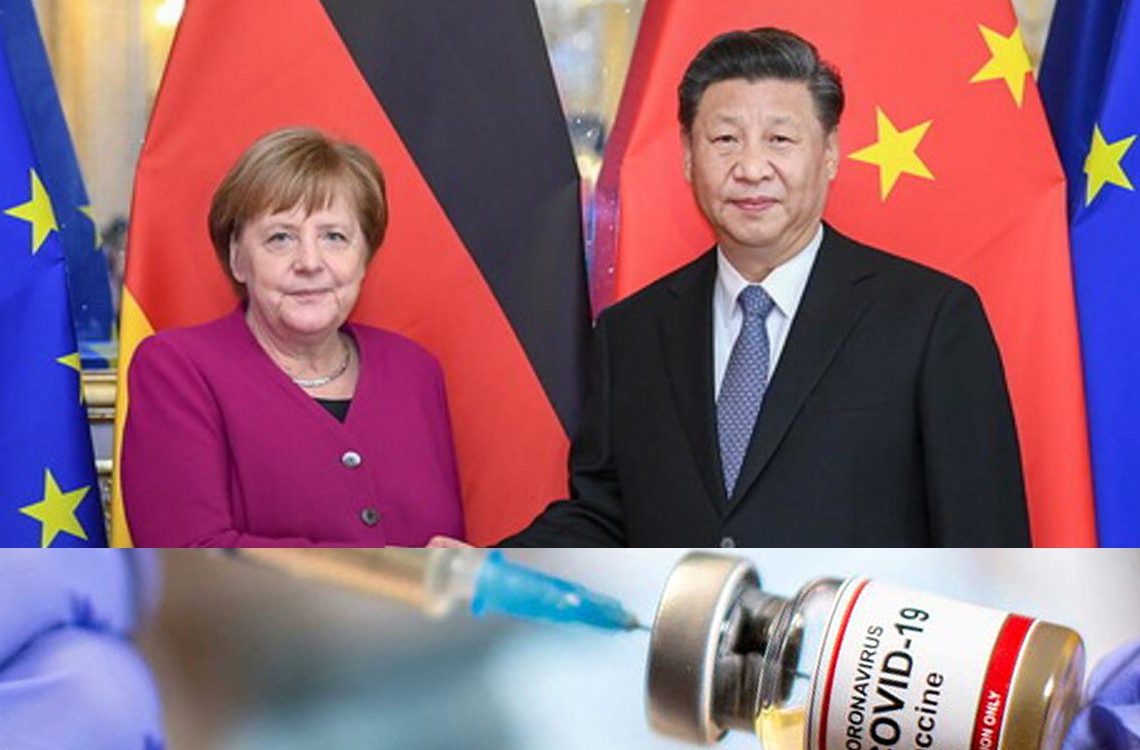
China’s President Xi and German Chancellor Merkel call for cooperation on COVID-19 vaccines as Canada fumbles
Ottawa Life Magazine has been publishing a Canada-China Series since 2013. The series focuses on bi-lateral interests, business affairs, people-to-people relations, Chinese culture and the Chinese diaspora in Canada. Since 2018 there has been tension in the Canada Chinese political relationship. Ottawa Life Magazine has continued and will continue to publish relevant information related to the bi-lateral relationship, including stories, columns and editorial features that present issues from the Chinese perspective, as well as from the Canadian government and other Canadian stakeholder points of view.
President urges China, EU to bolster exchanges, safeguard multilateralism
Chinese President Xi Jinping and German Chancellor Angela Merkel are calling for greater progress in areas such as vaccines, bilateral cooperation, and negotiations on the China-European Union Bilateral Investment Treaty. Xi told Merkel in a phone call last week that China is willing to strengthen exchanges and cooperation on vaccines with Germany to promote their fair distribution as global public goods, ‘especially for the benefit of developing countries’.
Merkel said that major changes are taking place in the world today, and Europe is facing the impact of a second wave of the pandemic. “China has done a good job in prevention and control of the pandemic, and its economy has taken the lead in recovery, which is good news for German enterprises”, she said. “It is hoped that the two sides will strengthen communication on vaccine cooperation and promote cooperation in areas such as trade and investment and new energy vehicles”, Merkel said. (At the November 2020 G20 Leaders' Summit both leaders called for strengthening multilateralism and international cooperation and the need for nations to combat the COVID-19 pandemic together, revive the world economy and to work together to meet global challenges).
China and Germany have maintained close communications and cooperation over the past year as the world continues to combat the coronavirus and both countries are committed to continuing working together in the post COVID-19 period. Prior to the pandemic, Germany and China were already forging closer ties. The German government announced, in October 2019, that it would not ban Chinese telecom giant Huawei from helping to build its national 5G networks, expressly refuting calls from the U.S. Trump administration to bar the company over national security concerns. The move was a blow to the U.S., which has been pressuring its allies to exclude Huawei from 5G infrastructure, claiming its presence in the networks would enable Chinese espionage.
France followed the German announcement last August when their information security agency ANSSI also rejected U.S. demands against Huawei by announcing that Huawei Technologies Ltd. would not be banned from France, but French telecoms operators that buy its technology would only be able to get licenses that are limited to eight years. 5G networks offer many technological advances, such as real-time data transfer, time-saving automation, autonomous vehicles, ubiquitous smart homes and many more. But 5G also means increasing the number of cell towers in the regions where the technology is installed and many jurisdictions including Canada are taking the precautionary principle before rolling out the new system. (Canada has yet to decide on whether it will participate in the 5G rollout and is facing great pressure from the United States to bow out.)
Besides cooperating with China on 5G and on COVID-19 vaccines, Germany is the key player working with other European countries to complete negotiations on the EU-China investment treaty. A EU-China Bilateral Investment Treaty will promote the building of EU-China business and dialogue mechanisms in environmental, climate and digital fields, and forge a partnership between China and the EU in green and digital fields. It is expected to further grow the EU-China comprehensive strategic partnership in the billions of dollars each year.
For its part President Xi said that, “China is actively shaping a new development paradigm while it expands domestic demand and opening-up, which will bring new opportunities to Germany.'' He said he hoped that “Germany and Europe will remain open to Chinese enterprises, and the two sides should adhere to mutual respect, based on dialogue and cooperation and featuring mutual benefit and win-win results.” Xi said that China-Europe cooperation is of strategic significance amid the complex international situation and that “The two sides should enhance mutual trust and cooperation, strengthen exchanges and mutual learning, safeguard multilateralism and improve global governance.”
As Germany and the EU grow their relationship with China, the Canadian government diplomatic rift with China continues. Relations between the Trudeau government and Beijing have been tense since the Trudeau government gave the go ahead for the RCMP to arrest Chinese high-tech executive Meng Wanzhou on an American extradition warrant in December 2018, in Vancouver. Within days, Chinese authorities detained Canadians Michael Kovrig and Michael Spavor on spying and espionage charges. The high-profile dispute has adversely impacted trade, bi-lateral business, and even bi-lateral cooperation in the development of medical vaccines for COVID-19.
A CanSino partnership with Dalhousie University has collapsed. The Canadian Centre for Vaccinology at Dalhousie University was to begin the trials through a partnership with the NRC and CanSino Biologics last June, after Health Canada had approved CanSino’s proposal. The Halifax lab was one of several participants whose work in 2014 led to an Ebola vaccine that was used in West Africa. On August 27, 2020, the vaccine-development partnership was cancelled, ending clinical trials that were to be conducted by the Dalhousie lab. At the time, the National Research Council of Canada released a statement saying that the CanSino Biologics vaccine intended for phase one clinical trials was not approved by Chinese customs for shipment to Canada. “Due to the delay in the shipment of the vaccine doses to Canada it is evident this specific opportunity is over, and the NRC is focusing its team and facilities on other partners and COVID-19 priorities.”
Canada’s Foreign Affairs Minister François-Philippe Champagne downplayed suggestions the vaccine partnership failed because of ongoing political tensions between the two countries.
“I don’t necessarily think so,” Champagne told reporters Thursday. “I can only speak for the Canadian side. I would not necessarily link whether that particular opportunity is linked to anything else.” Champagne added that, “we have issues in terms of global health where we can work together.”
Dr. Scott Halperin, the director of the Canadian Centre for Vaccinology at Dalhousie said it was disappointing the CanSino project won’t be going ahead. “The CanSino vaccine is one of the furthest along of any of the candidate vaccines so it would have been nice to do that study. It’s not the only vaccine that we are working with … but we certainly don’t like to lose access to any one of them because we need multiple vaccines.” Halperin added that, “all of the protocols had been written and approved and had the Halifax lab received the vaccine its study would have been ‘well along by now’. We thought the shipment would be coming any day, as did the company,” he said. “There was no bad faith on the company — they were trying everything, but they could not get (Chinese) government approval to ship it. The request for shipment hasn’t been denied, it just hasn’t been approved.”
Last week Prime Minister Justin Trudeau acknowledged that Canada is at a “disadvantage” when it comes to providing Canadians with a coronavirus vaccine because Canada “no longer has any domestic production capability to make our own and is relying on other nations.” Trudeau said that the countries where pharmaceutical companies are based, including the United States, will “obviously” prioritize vaccinating their citizens before shipping doses internationally, including to Canada. Canada does produce some vaccines, but not the kind for COVID-19.
On Friday, the Public Health Agency of Canada confirmed that Canada will receive an initial six million doses by March, four million from Pfizer and two million from Moderna. In total, Canada has signed deals with seven vaccine manufacturers, securing more vaccines per capita than other countries. The deals include an agreement with Canadian-based Medicago, whose vaccine candidate remains the farthest away from approval of those Canada has contracts with.
Meanwhile, another Chinese company, China National Pharmaceutical Group (Sinopharm) reported that they have already provided COVID-19 vaccinations to over 1 million Chinese citizens and continue to roll out vaccines in that country in addition to selling millions of doses to Turkey and Brazil.
Photo: March 2019, Ministry of Foreign Affairs, the People's Republic of China









